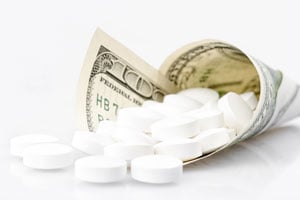Last week, I called out drug company Valeant Pharmaceuticals International Inc. (NYSE: VRX) as a bad investment and a stock that's going down.
I showed you how it operates as a highly leveraged "serial acquirer" that buys other companies only to fire their workers and hike the prices of their drugs.
I also told you the company's strategy was about to backfire.
But that happened faster than even I expected...
On Thursday, Valeant announced the U.S. government subpoenaed the company over its drug-pricing practices for two specific drugs. Valeant stock dropped sharply in that session and then recovered on Friday. But investors were clearly nervous as they waited for the company's third-quarter earnings report on Monday.
It turns out they had good reason to worry. Not so much about earnings, which came in on target. The company earned $3.54 per share on $3.6 billion in revenue, in line with Wall Street expectations. And it nudged up guidance for the year to between $11.67 and $11.87 in earnings per share and said revenue would be between $11 billion and $11.2 billion.
But management announced several changes to Valeant's strategy that suggest that the company is changing course. And investors reacted by sending shares into a freefall. The Valeant stock price went from $177 at close Friday to below $160. It recovered to $163 by close Monday but was under more pressure Tuesday morning - and will stay there.
Bad Problems and Worse Solutions
 The changes address two of the concerns that I raised last week. Just to review, concerns about Valeant center on the following issues. First, it is highly leveraged with $30 billion in debt. Second, it relies on buying competitors and firing their employees. Third, it profits from sharply raising the prices of newly acquired drugs, leaving consumers or, more often, the government and insurance companies to pay the tab. And fourth, it spends only 3% of revenue on R&D compared to 15% to 20% for most other drug companies.
The changes address two of the concerns that I raised last week. Just to review, concerns about Valeant center on the following issues. First, it is highly leveraged with $30 billion in debt. Second, it relies on buying competitors and firing their employees. Third, it profits from sharply raising the prices of newly acquired drugs, leaving consumers or, more often, the government and insurance companies to pay the tab. And fourth, it spends only 3% of revenue on R&D compared to 15% to 20% for most other drug companies.
This predatory business model has enriched management and a bunch of hedge funds but has left everyone else with whom the company has come into contact severely damaged.
Having seen its bloated stock price sink 30% in the last few weeks, management told the market Monday that it was going to change its stripes. And the market didn't like what it heard one bit.
Here's What Valeant's Going to Do (and Why It's Bad)
First, the company said it will reduce its dependence on raising drug prices to boost profits. Price increases have accounted for about 8% of revenue growth in the first nine months of 2015. But Chairman Michael Pearson told investors that outside pressures - meaning politicians - are changing the pricing environment. In other words, they are appropriately disgusted that a company that spends virtually nothing on R&D is raising prices on old drugs in order to pad its bottom line. For once, the people in D.C. are doing the right thing. As a result, the company expects to keep price increases, which have averaged 66% over the last years, to no more than 10% next year.
[mmpazkzone name="in-story" network="9794" site="307044" id="137008" type="4"]
He also said that the company would stop buying old drugs and raising their prices, one of its key strategies in recent years. Having been caught with his hand in the cookie jar, Mr. Pearson figures he better take it out before his whole arm gets cut off.
Second, the company also plans to try to sell its controversial neuroscience unit, which has grown almost exclusively through price increases. The unit is home to two drugs on which the company raised prices by 525% and 212%, respectively, which attracted the attention of Congressional Democrats. Again, the company is trying to run as far as it can from its reputation for raising drug prices.
It may appear that Valeant is trying to solve the problem I pointed out with its business model. But unfortunately, this only accelerates the fallout.
The problem is that the company was built on the strategy of buying other companies' old drugs and marking up their prices. And it used tens of billions of dollars of debt to do so. The question now is whether it will be able to handle the $30 billion of debt that it borrowed in the process.
Stock investors have their doubts. They sent the stock down almost 10% Monday to drop through the $160 level. I suspect the sell-off has much further to run. This stock could fall to $100/share.
VRX may be in for a "Super Crash" of its own.
Follow us on Twitter @moneymorning.
Editor's Note: Overvalued biotech stocks like Valeant will get hit the hardest in the upcoming "Super Crash" Michael's predicted. His Sure Money readers are getting the updates they need to protect themselves and take profits as stocks dive lower. Click here to receive Sure Money yourself at no charge, and you'll get his Super Crash report, too.
About the Author
Prominent money manager. Has built top-ranked credit and hedge funds, managed billions for institutional and high-net-worth clients. 29-year career.



